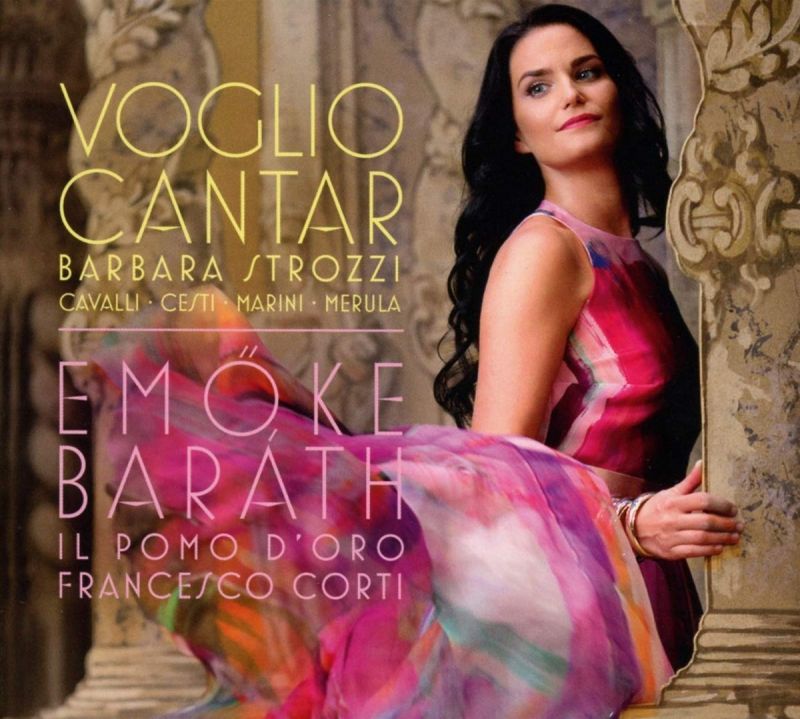Emőke Baráth: Voglio cantar
View record and artist detailsRecord and Artist Details
Composer or Director: (Pietro) Francesco Cavalli, Biagio Marini, Barbara Strozzi, Tarquinio Merula, Antonio Cesti
Genre:
Vocal
Label: Erato
Magazine Review Date: 03/2019
Media Format: CD or Download
Media Runtime: 80
Mastering:
DDD
Catalogue Number: 9029 56322-1

Tracks:
| Composition | Artist Credit |
|---|---|
| Canzon a 3 |
(Pietro) Francesco Cavalli, Composer
(Pietro) Francesco Cavalli, Composer Emöke Baráth, Soprano Francesco Corti, Conductor Il Pomo d'Oro |
| Statira, Principessa di Persia, Movement: Sinfonia |
(Pietro) Francesco Cavalli, Composer
(Pietro) Francesco Cavalli, Composer Emöke Baráth, Soprano Francesco Corti, Conductor Il Pomo d'Oro |
| Statira, Principessa di Persia, Movement: Alba, ch’imperli i fiori … Amor, che mascherasti |
(Pietro) Francesco Cavalli, Composer
(Pietro) Francesco Cavalli, Composer Emöke Baráth, Soprano Francesco Corti, Conductor Il Pomo d'Oro |
| Statira, Principessa di Persia, Movement: Cresce il foco, avvampa il core |
(Pietro) Francesco Cavalli, Composer
(Pietro) Francesco Cavalli, Composer Emöke Baráth, Soprano Francesco Corti, Conductor Il Pomo d'Oro |
| Statira, Principessa di Persia, Movement: Vanne intrepido o mio bene |
(Pietro) Francesco Cavalli, Composer
(Pietro) Francesco Cavalli, Composer Emöke Baráth, Soprano Francesco Corti, Conductor Il Pomo d'Oro |
| Speranza ingannatrice |
Antonio Cesti, Composer
Antonio Cesti, Composer Emöke Baráth, Soprano Francesco Corti, Conductor Il Pomo d'Oro |
| Affetti musicali, Movement: Sinfonia grave ‘La Zorzi’ |
Biagio Marini, Composer
Biagio Marini, Composer Emöke Baráth, Soprano Francesco Corti, Conductor Il Pomo d'Oro |
| Sonata sopra Fuggi dolente core |
Biagio Marini, Composer
Biagio Marini, Composer Emöke Baráth, Soprano Francesco Corti, Conductor Il Pomo d'Oro |
| Ballo detto Eccardo |
Tarquinio Merula, Composer
Emöke Baráth, Soprano Francesco Corti, Conductor Il Pomo d'Oro Tarquinio Merula, Composer |
| Amante loquace |
Barbara Strozzi, Composer
Barbara Strozzi, Composer Emöke Baráth, Soprano Francesco Corti, Conductor Il Pomo d'Oro |
| Arie a voce sola, Movement: No 4, L’Astratto |
Barbara Strozzi, Composer
Barbara Strozzi, Composer Emöke Baráth, Soprano Francesco Corti, Conductor Il Pomo d'Oro |
| Arie a voce sola, Movement: No 6, Che si può fare |
Barbara Strozzi, Composer
Barbara Strozzi, Composer Emöke Baráth, Soprano Francesco Corti, Conductor Il Pomo d'Oro |
| Diporti di Euterpe, avero Canate e ariette a voce, Movement: Lamento (Lagrime mie) |
Barbara Strozzi, Composer
Barbara Strozzi, Composer Emöke Baráth, Soprano Francesco Corti, Conductor Il Pomo d'Oro |
| Diporti di Euterpe, avero Canate e ariette a voce, Movement: Mi fa rider la Speranza |
Barbara Strozzi, Composer
Barbara Strozzi, Composer Emöke Baráth, Soprano Francesco Corti, Conductor Il Pomo d'Oro |
| Cantate, ariette e duetti, Movement: Il lamento (Sul Rodano severo) |
Barbara Strozzi, Composer
Barbara Strozzi, Composer Emöke Baráth, Soprano Francesco Corti, Conductor Il Pomo d'Oro |
Author: Lindsay Kemp
Strozzi never wrote an opera, but the tortured love domain she explored in her ariettas and cantatas is an intense one. Baráth sings six of these pieces, setting them alongside a cantata by Antonio Cesti and a group of arias from the opera Statira, principessa di Persia by her teacher Francesco Cavalli, and the comparison is a revealing one, the confident public art of the two big-name opera composers throwing into relief Strozzi’s more natural emotional truth. The daughter of a poet and librettist, and a regular speaker at his intellectual debating shop, she had no fear of sophisticated literary texts and could respond with honesty, intimacy and a total lack of musical posturing. The affecting falling intervals of her dark laments strike to the heart like a knife, and when there is playfulness it can still work to a serious and wholly appropriate end: ‘L’Astratto’, the piece that ends the programme, shows a love-letter writer rejecting various artificial styles before arriving at his true message – that it is love that controls him rather than the other way round.
Baráth’s voice is strong, bright and clear, innately attractive with crisply enunciated words. One might wish for a wider range of colours, and indeed over time she can seem a little full-on in this music; it might just be that, for the time being at least, it is Cavalli’s outgoing operatic world that suits her better. The expert contributions from Il Pomo d’Oro, including short instrumental interludes by Marini and Merula, are typically tight and pingy.
Explore the world’s largest classical music catalogue on Apple Music Classical.
Included with an Apple Music subscription. Download now.

Gramophone Digital Club
- Digital Edition
- Digital Archive
- Reviews Database
- Events & Offers
From £9.20 / month
Subscribe
Gramophone Club
- Print Edition
- Digital Edition
- Digital Archive
- Reviews Database
- Events & Offers
From £11.45 / month
Subscribe
If you are a library, university or other organisation that would be interested in an institutional subscription to Gramophone please click here for further information.






